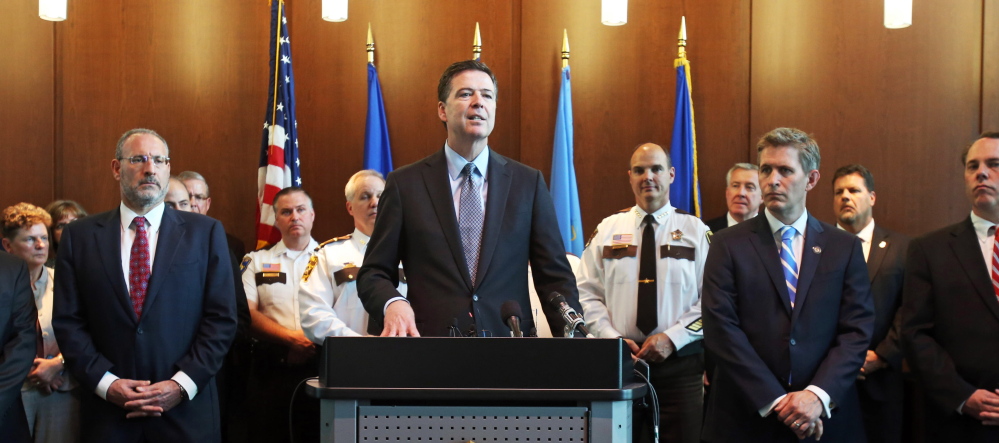WASHINGTON — U.S. special forces seized a “key leader” of the deadly Benghazi, Libya, attack and he is on his way to face trial in the U.S. for the fiery assault that killed the U.S. ambassador and three other Americans, the Obama administration announced Tuesday. It was the first breakthrough in the sudden overseas violence in 2012 that has become a festering political sore at home.
President Barack Obama said the capture on Sunday of Ahmed Abu Khattala sends a clear message to the world that “when Americans are attacked, no matter how long it takes, we will find those responsible and we will bring them to justice.”
“We will find you,” Obama declared.
As recently as last August, though, Abu Khattala told The Associated Press that he was not in hiding nor had he been questioned by Libyan authorities about the attack at the diplomatic compound. He denied involvement and said that he had abandoned the militia. Administration officials said Tuesday that despite his media interviews, he “evaded capture” until the weekend when military special forces, including members of the Army’s elite Delta Force, nabbed him.
Whatever the path to his capture, he was headed for the United States to face what Obama called “the full weight of the American justice system.” Obama called the Libyan an “alleged key leader” of the attack.
SENIOR LEADER OF TERROR GROUP
U.S. officials said Abu Khattala was being held on the Navy amphibious transport dock ship USS New York, which was in the Mediterranean Sea. The officials spoke only on condition of anonymity because they weren’t authorized to discuss Abu Khattala’s whereabouts.
The Libyan was the commander of a militant group called the Abu Obaida bin Jarrah Brigade and is accused of being a senior leader of the Benghazi branch of Ansar al-Shariah in Libya, which the U.S. has designated a terror group.
On Capitol Hill, Republicans urged the administration to get as much intelligence out of Abu Khattala as possible before anyone reads him his rights to remain silent, supplies him with a lawyer and prepares him for trial in a U.S. courtroom. In fact, Sen. Saxby Chambliss of Georgia, top Republican on the Intelligence Committee, said interrogation of the Libyan already was underway and “we hope to find out some positive things.”
Abu Khattala is charged with terror-related crimes in U.S. District Court in Washington and will be tried like a civilian, the administration said. The Obama administration policy is to treat terror suspects as criminals when possible and not send them to the military prison in Guantanamo Bay, Cuba, like hundreds of terror suspects captured during the administration of President George W. Bush.
MORE ARRESTS POSSIBLE
The Sept. 11, 2012, attack in Benghazi, on the 11th anniversary of the World Trade Center attacks, killed U.S. Ambassador Chris Stevens and three other Americans. Stevens was the first U.S. ambassador to be killed in the line of duty in more than 30 years. In the immediate aftermath, political reaction formed along sharply drawn lines that hold fast to this day.
According to a criminal complaint unsealed Tuesday, Abu Khattala is charged with killing a person in the course of an attack on a federal facility and conspiring to do so; providing, attempting and conspiring to provide material support to terrorists that resulted in death, and discharging, brandishing, using, carrying and possessing a firearm during a crime of violence.
Officials said he could face the death penalty if convicted of the first charge.
His arrest may well not be the last. “Even as we begin the process of putting Khattala on trial and seeking his conviction before a jury, our investigation will remain ongoing as we work to identify and arrest any co-conspirators,” Attorney General Eric Holder said. FBI Director James Comey, speaking in Minnesota, said Abu Khattala’s arrest sends a message to others who need to be held accountable that “we will shrink the world to bring you to justice.”
Send questions/comments to the editors.



Success. Please wait for the page to reload. If the page does not reload within 5 seconds, please refresh the page.
Enter your email and password to access comments.
Hi, to comment on stories you must . This profile is in addition to your subscription and website login.
Already have a commenting profile? .
Invalid username/password.
Please check your email to confirm and complete your registration.
Only subscribers are eligible to post comments. Please subscribe or login first for digital access. Here’s why.
Use the form below to reset your password. When you've submitted your account email, we will send an email with a reset code.